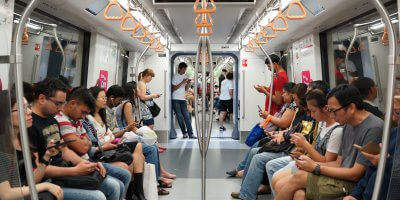
Singapore’s 5G technology will be powering remote surgeries, helping driverless cars avoid collisions, drones delivery, and more. Source: Shutterstock
What do Singapore’s 5G rules mean for commercial users?
SINGAPORE is determined to provide at least 50 percent 5G coverage islandwide by 2023.
As a result, regulators are paying close attention to the financial ability of telcos to procure the game-changing network technology.
The move to 5G is considered as a quantum leap from its predecessor and will accelerate the growth of commercial applications.
So, industries that foresee the use of autonomous vehicles, the internet of things (IoT), and cloud-based virtual reality (VR) solutions can gain significant advantages with 5G.
The ultra-fast network technology is the foundation of tomorrow’s smart cities and Singapore’s regulatory requirements are making sure that the playing field for 5G providers is fair game.
According to the Infocomm Media Development Authority (IMDA), only two telcos will be assigned 5G airwaves by 2020 via a call for proposal.
As a result, IMDA will be assessing not only the deployment plans but also the telcos’ willingness to sell network services wholesale to providers that are not granted the 5G airwaves.
Singapore’s 5G strategy
Singapore is Asia’s technology capital largely because the government recognizes its importance in the economy and supports the necessary infrastructure.
Minister for Communications and Information S. Iswaran has time and time again reiterated the importance of 5G in the country’s digital economy.
“To further differentiate Singapore’s 5G strategy, we also aim to advance innovation in secure 5G applications and services that we can potentially export to the rest of the world,” Iswaran said in Parliament recently.
By theory, the fifth generation network technology is twenty times faster than 4G at top speed. Hence 5G’s ability is expected to provide a major boost to the economy.
In addition, another one of the requirements that Singapore has for the proposals is that it does not piggyback on 4G technologies.
This opens up the opportunity for local telco companies to pick equipment suppliers from the ground up.
To sum it all, with great power comes great responsibility for the eventual two 5G providers in Singapore.
Eventually, the network technology will be powering remote surgeries, helping autonomous cars avoid collisions, drones supplies delivery, and more. The possibilities are truly infinite.
All labor-constrained markets, the likes of Singapore, will experience major shifts upon the implementation of 5G network technology.
It is exciting to see how Asia’s technology capital will be leading the pack for 5G.
READ MORE
- Safer Automation: How Sophic and Firmus Succeeded in Malaysia with MDEC’s Support
- Privilege granted, not gained: Intelligent authorization for enhanced infrastructure productivity
- Low-Code produces the Proof-of-Possibilities
- New Wearables Enable Staff to Work Faster and Safer
- Experts weigh in on Oracle’s departure from adland




